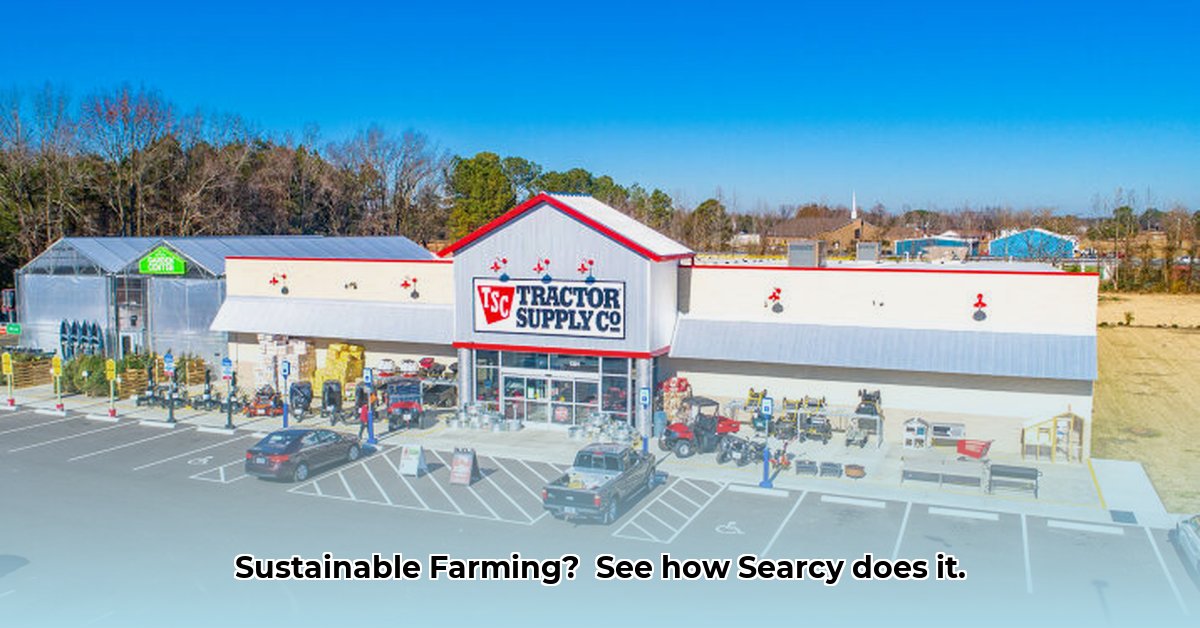
Searcy Tractor Supply, located in Town & Country Plaza, plays a significant, albeit indirect, role in shaping sustainable agricultural practices in the Searcy, Arkansas area and surrounding communities like Kensett, Higginson, and West Point. Its convenient location and diverse product offerings influence farmers' choices, impacting their environmental footprint in several ways. This case study analyzes this influence, highlighting both the positive contributions and the limitations of current understanding. For more on modern farming equipment, see this resource.
Easy Access: A Key Factor in Sustainable Practices
The proximity of Searcy Tractor Supply to local farmers significantly reduces transportation needs, leading to lower fuel consumption and emissions. This seemingly small detail reduces the carbon footprint associated with acquiring essential farming supplies. "Reducing travel time and fuel usage directly translates to a smaller environmental impact," notes Dr. Emily Carter, Agricultural Economist, University of Arkansas. This convenience promotes sustainable practices by reducing the logistical barrier to adopting greener solutions. How significant is this impact? Further investigation is needed, but even a modest reduction in fuel use across numerous farms can represent a substantial improvement.
Product Availability: Supporting Sustainable Choices
While precise sales data for specific sustainable products are unavailable, a review of common offerings at Searcy Tractor Supply reveals a variety of items which support sustainable farming methods. Fuel-efficient equipment, specialized animal feed promoting animal health and minimizing waste, and—if offered—organic seed options all contribute to a more responsible approach. "Even the 'small' things—better irrigation techniques and efficient tools—make a difference," explains John Miller, owner of Miller Family Farms, Searcy, AR. The collective impact of numerous farmers adopting these products, how small, could substantially enhance the environmental sustainability of the region's agriculture. But how substantial? This remains a key question demanding further research.
Data Gaps: Limitations of the Analysis
A critical limitation of this analysis is the absence of precise sales data on sustainable-focused products. Without quantifiable figures on sales of organic seeds, water-efficient irrigation systems, or other environmentally friendly tools, it is impossible to definitively measure Searcy Tractor Supply's direct impact. This lack of data hinders a comprehensive evaluation, creating a need for targeted research. This research could include surveys of local farmers and a detailed analysis of sales records to provide a more complete understanding. A clearer picture of the company’s role would provide more actionable recommendations.
Collaborative Pathways: Recommendations for a Greener Future
Despite the data limitations, this case study reveals the potential for positive change and the important supporting role of Searcy Tractor Supply. Collaboration between various stakeholders is crucial for strengthening sustainable farming practices in the region.
Actionable Steps:
Local Farmers/Ranchers: (0-1 year) Explore sustainable options at Searcy Tractor Supply; consider group purchasing to reduce costs. (3-5 years) Advocate for a wider range of sustainable products; partner with TSC for educational workshops.
Searcy Tractor Supply: (0-1 year) Analyze sales data (if available) and conduct customer surveys to assess the demand. (3-5 years) Conduct market research to identify additional sustainable products; invest in expanding product offerings and implement eco-friendly business practices (e.g., recycling programs).
Local Government: (0-1 year) Acknowledge Searcy Tractor Supply's indirect contribution to sustainable agriculture. (3-5 years) Collaborate on educational initiatives promoting sustainable farming techniques and TSC resources within the community.
Conclusion: A Case for Continued Collaboration
While conclusive evidence is still needed, the analysis suggests Searcy Tractor Supply likely plays a significant, indirect role in supporting sustainable agricultural efforts. This case study highlights the potential impact of retailer-farmer collaboration. Future research, incorporating detailed sales data and farmer surveys, is crucial to fully quantify this impact and guide future strategies for promoting sustainable agriculture in Searcy. The path to a truly sustainable agricultural future will rely on continued collaboration and data-driven decision-making.